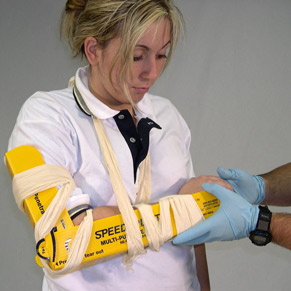Standard First Aid provides comprehensive training covering all aspects of first aid and CPR. Standard First Aid incorporates all of Emergency First Aid and is designed for those who require a more in-depth understanding of first aid including: legal implications of first aid treatment, spinal injuries, heat or cold injuries, bone and joint injuries, chest injuries, and medical emergencies. Includes CPR-C certification.
The first aid program is not restricted to aquatic candidates. You can use the Lifesaving Society's first aid awards to train non-aquatic staff (camp, playground, maintenance, etc.) and the general public.
Prerequisite: None.
Instruction & certification: Current First Aid Instructors teach Standard First Aid, but only current First Aid Examiners may certify candidates. Lifesaving Society Standard First Aid certification is valid for 36 months from the certification date.
Candidate recognition: Certification card.
Required reference material: Canadian First Aid Manual or Canadian Lifesaving Manual. (Note that some affiliates provide materials to candidates, and some require candidates to purchase materials on their own. Double check before you purchase.)

Recertification: Current Standard First Aid (SFA) award holders may recertify their Lifesaving Society SFA certification just once on a Lifesaving Society SFA Recertification Course not more than 3 years from the Standard First Aid date of issue. To renew SFA certifications subsequently, award holders must repeat the full SFA Course. Thereafter, individuals may renew by alternating recertifications and original courses.
Holders of Standard First Aid certificates from other agencies may not recertify their certificate on a Lifesaving Society recertification course. They may recertify only with the original certifying agency.
Standard First Aid recert policy
The Ontario Workplace Safety & Insurance Board (WSIB) specifies that Standard First Aid (SFA) award holders may recertify just once on a SFA recertification course. To renew a SFA certification subsequently, you are required to repeat the full course. Thereafter, you may renew by alternating recertifications and original courses.
If your SFA certification is older than three years, you are required to take the full course (not a recert) again.
Holders of Standard First Aid certificates must recertify only with the original certifying agency. Check your Lifesaving Society qualifications using Find a Member before you attend your Standard First Aid recertification to make sure you meet the requirement.
at-a-glance
Standard First Aid includes the 13 Emergency First Aid items in addition to the following:
- Demonstrate two-rescuer adult, child and infant cardiopulmonary resuscitation on a manikin.
- Demonstrate the recognition and care of a victim with a suspected spinal injury on land.
- Demonstrate the recognition and care of a victim suffering from:
- heat cramps, heat exhaustion, and heat stroke
- hypothermia and frostbite
- Demonstrate the recognition and care of a bone or joint injury.
- Demonstrate the recognition and care of a chest injury.
- Demonstrate the recognition and care of a head injury.
- Demonstrate the recognition and care of a seizure victim.
- Demonstrate the recognition and care of a diabetic emergency.
- Demonstrate the recognition and care of a victim suffering from suspected poisoning.
- Demonstrate an understanding of the effects of stress on victims, rescuers, and bystanders, as well as the consequences of an unsuccessful rescue.
First Aid Prerequisites
When a first aid certification from an agency other than the Lifesaving Society is used as a prerequisite for a Lifesaving Society award, a photocopy of the certification card must accompany the Lifesaving Society test sheets. The Society will not issue awards if this proof of prerequisite is missing.
For prerequisite purposes, the Lifesaving Society accepts Emergency First Aid and Standard First Aid certifications provided by training agencies approved by the Ontario Ministry of Labour or the Ontario Ministry of Health and Long-Term Care. Here is the list of approved agencies.